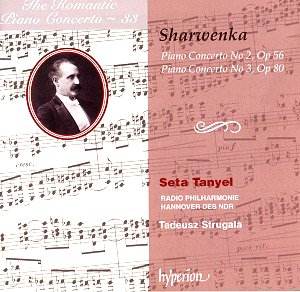Polish-born, educated in Berlin, Scharwenka completed
his First Piano Concerto in 1877. He went on to write three others.
The affirmative, storming first movement of the
Second Concerto has a few moments of high romantic relaxation
but otherwise plays like an optimistic cross between Schumann
and Brahms. The central movement veers delicately between Chopin
and Tchaikovsky. The finale is the most original of the three
with romping vitality and a real Klezmer skirl. Tanyel plays it
with a delightful rolling gait and relishes the return, at the
end, of the theme from the opening of the work. Real chutzpah!
The Third Piano Concerto feels more symphonic
than the Second. This sounds quite 'modern' and resolute of purpose.
The ursine defiance is a quality I associate with the Second Piano
Concertos of Brahms and Stanford. After a seriously-intentioned
adagio the final allegro non troppo has a few moments of
off-guard levity to link back with the filigree and thunder and
lightning of the First and Second concertos. There are gracious
zephyrs at play here too if you listen to the section at 5.50
(tr.6) where the music seems to have trodden the same fields as
those evoked in Beethoven's Pastoral.
I have been calling for the release of this disc
ever since Hyperion issued all the other Tanyel Collins/Scharwenka
CDs. Its return to availability is to be welcomed.
These are good performances by soloist and orchestra
and this is the place to start your Scharwenka collection.
Altogether a most appealing disc with only three
faintly negative remarks to make: 1. the piano sounds rather 'chesty'
and while sounding pleasing lacks the ultimate in high definition
glint. 2. the other Collins Scharwenka discs have been issued
by Hyperion at Helios or Dyad price. This one is at premium price.
3. The front cover of the CD has the name as 'Sharwenka' - presumably
a misprint for Scharwenka.
No-one else has the coupling and the performances
are very good indeed. Tanyel has become the Scharwenka
'priestess' as much as Eric Parkin became the voice of Arnold
Bax and John Ireland.
Rob Barnett
Other issues in this series
